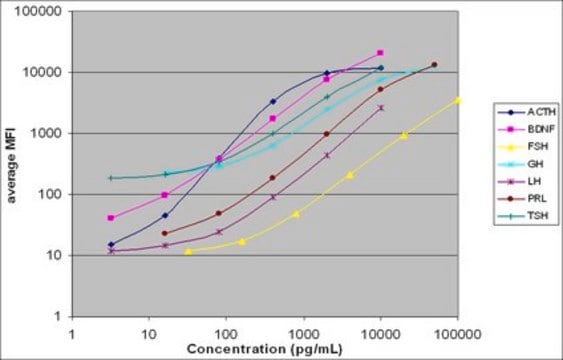RTHYMAG-30K
MILLIPLEX® Rat Thyroid Magnetic Bead Panel - Endocrine Multiplex Assay
The analytes available for this multiplex kit are: TSH, T3, T4.
About This Item
Recommended Products
Quality Level
species reactivity
rat
manufacturer/tradename
Milliplex®
assay range
sensitivity: 2255 pg/mL
(T4)
sensitivity: 284 pg/mL
(T3)
sensitivity: 38 pg/mL
(TSH)
standard curve range: 41-10,000 pg/mL
(TSH & T3)
standard curve range: 823-200,00 pg/mL
(T4)
inter-assay cv: <15%
intra-assay cv: <10%
technique(s)
multiplexing: suitable
detection method
fluorometric (Luminex xMAP)
shipped in
wet ice
General description
MILLIPLEX® Rat Thyroid Hormone Panel is a 3-plex kit to be used for the simultaneous quantification of any or all of the following analytes in serum, plasma and tissue culture samples: T3 (competitive assay), T4 (competitive assay), and TSH. This kit uses a 96-well format, contains a lyophilized standard cocktail, two internal assay quality controls and can measure up to 38 samples in duplicate.
The Luminex® xMAP® platform uses a magnetic bead immunoassay format for ideal speed and sensitivity to quantitate multiple analytes simultaneously, dramatically improving productivity while conserving valuable sample volume.
Panel Type: Endocrine
Specificity
There was no or negligible cross-reactivity between the analytes within the panel.
Application
- Analytes: T3, T4, TSH
- NOTE: T3 and T4 are competitive immunoassays
- Recommended Sample Type: Rat serum, plasma, cell/tissue culture supernatants or lysates
- Recommended Sample Dilution: 25 μL per well 1:6 diluted serum or plasma; cell/tissue culture samples may require dilution in an appropriate control medium.
- Assay Run Time: Overnight (16-18 hours) at 2-8°C
- Research Category: Endocrine
- Research Category: Metabolism
Features and Benefits
Other Notes
Legal Information
Disclaimer
Signal Word
Danger
Hazard Statements
Precautionary Statements
Hazard Classifications
Acute Tox. 3 Dermal - Acute Tox. 4 Inhalation - Acute Tox. 4 Oral - Aquatic Chronic 2 - Eye Irrit. 2 - Skin Sens. 1
Storage Class Code
6.1C - Combustible acute toxic Cat.3 / toxic compounds or compounds which causing chronic effects
Certificates of Analysis (COA)
Search for Certificates of Analysis (COA) by entering the products Lot/Batch Number. Lot and Batch Numbers can be found on a product’s label following the words ‘Lot’ or ‘Batch’.
Already Own This Product?
Find documentation for the products that you have recently purchased in the Document Library.
Related Content
Multiplex immunoassays save time and sample volume in metabolic syndrome research, providing comprehensive insights into related conditions.
Multiplex immunoassays save time and sample volume in metabolic syndrome research, providing comprehensive insights into related conditions.
Multiplex immunoassays save time and sample volume in metabolic syndrome research, providing comprehensive insights into related conditions.
Multiplex immunoassays save time and sample volume in metabolic syndrome research, providing comprehensive insights into related conditions.
Our team of scientists has experience in all areas of research including Life Science, Material Science, Chemical Synthesis, Chromatography, Analytical and many others.
Contact Technical Service










